Graphing Lines Using X- and Y- Intercepts
Learning Outcomes
- Graph a linear equation using x- and y-intercepts
Graph a Line Using the Intercepts
To graph a linear equation by plotting points, you can use the intercepts as two of your three points. Find the two intercepts, and then a third point to ensure accuracy, and draw the line. This method is often the quickest way to graph a line.Graph a line using the intercepts
- Find the [latex]x-[/latex] and [latex]\text{y-intercepts}[/latex] of the line.
- Let [latex]y=0[/latex] and solve for [latex]x[/latex]
- Let [latex]x=0[/latex] and solve for [latex]y[/latex].
- Find a third solution to the equation.
- Plot the three points and then check that they line up.
- Draw the line.
example
Graph [latex]-x+2y=6[/latex] using intercepts. Solution First, find the [latex]x\text{-intercept}[/latex].Let [latex]y=0[/latex], [latex-display]\begin{array}{}\\ -x+2y=6\\ -x+2\left(0\right)=6\\ -x=6\\ x=-6\end{array}[/latex-display] The [latex]x\text{-intercept}[/latex] is [latex]\left(-6,0\right)[/latex].
Now find the [latex]y\text{-intercept}[/latex].Let [latex]x=0[/latex]. [latex-display]\begin{array}{}\\ -x+2y=6\\ -0+2y=6\\ \\ \\ 2y=6\\ y=3\end{array}[/latex-display] The [latex]y\text{-intercept}[/latex] is [latex]\left(0,3\right)[/latex].
Find a third point.We’ll use [latex]x=2[/latex], [latex-display]\begin{array}{}\\ -x+2y=6\\ -2+2y=6\\ \\ \\ 2y=8\\ y=4\end{array}[/latex-display] A third solution to the equation is [latex]\left(2,4\right)[/latex].
Summarize the three points in a table and then plot them on a graph.| [latex]-x+2y=6[/latex] | ||
|---|---|---|
| x | y | (x,y) |
| [latex]-6[/latex] | [latex]0[/latex] | [latex]\left(-6,0\right)[/latex] |
| [latex]0[/latex] | [latex]3[/latex] | [latex]\left(0,3\right)[/latex] |
| [latex]2[/latex] | [latex]4[/latex] | [latex]\left(2,4\right)[/latex] |
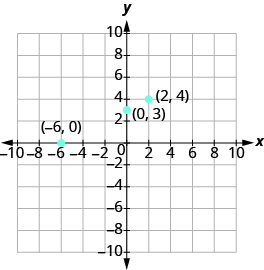 Do the points line up? Yes, so draw line through the points.
Do the points line up? Yes, so draw line through the points.
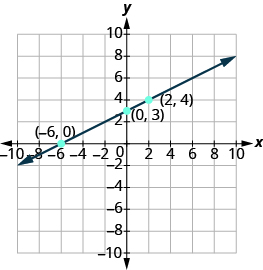
Example
Graph [latex]5y+3x=30[/latex] using the x and y-intercepts.Answer: When an equation is in [latex]Ax+By=C[/latex] form, you can easily find the x- and y-intercepts and then graph.
[latex]\begin{array}{r}5y+3x=30\\5y+3\left(0\right)=30\\5y+0=30\\5y=30\\y=\,\,\,6\\y\text{-intercept}\,\left(0,6\right)\end{array}[/latex]
To find the y-intercept, set [latex]x=0[/latex] and solve for y.[latex]\begin{array}{r}5y+3x=30\\5\left(0\right)+3x=30\\0+3x=30\\3x=30\\x=10\\x\text{-intercept}\left(10,0\right)\end{array}[/latex]
To find the x-intercept, set [latex]y=0[/latex] and solve for x.Answer
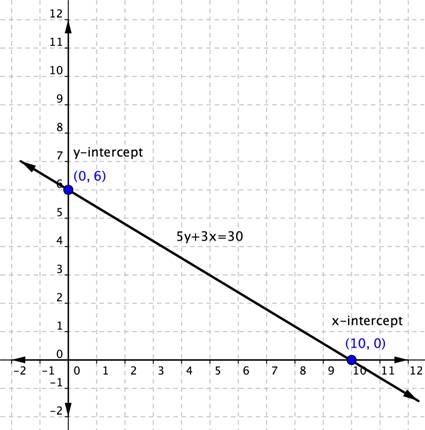
try it
[ohm_question]146999[/ohm_question]example
Graph [latex]4x - 3y=12[/latex] using intercepts.Answer:
Solution
Find the intercepts and a third point.
 We list the points and show the graph.
We list the points and show the graph.
| [latex]4x - 3y=12[/latex] | ||
|---|---|---|
| [latex]x[/latex] | [latex]y[/latex] | [latex]\left(x,y\right)[/latex] |
| [latex]3[/latex] | [latex]0[/latex] | [latex]\left(3,0\right)[/latex] |
| [latex]0[/latex] | [latex]-4[/latex] | [latex]\left(0,-4\right)[/latex] |
| [latex]6[/latex] | [latex]4[/latex] | [latex]\left(6,4\right)[/latex] |
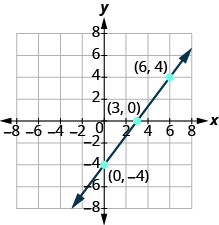
try it
[ohm_question]146998[/ohm_question]example
Graph [latex]y=5x[/latex] using the intercepts.Answer:
Solution
 This line has only one intercept! It is the point [latex]\left(0,0\right)[/latex].
To ensure accuracy, we need to plot three points. Since the intercepts are the same point, we need two more points to graph the line. As always, we can choose any values for [latex]x[/latex], so we’ll let [latex]x[/latex] be [latex]1[/latex] and [latex]-1[/latex].
This line has only one intercept! It is the point [latex]\left(0,0\right)[/latex].
To ensure accuracy, we need to plot three points. Since the intercepts are the same point, we need two more points to graph the line. As always, we can choose any values for [latex]x[/latex], so we’ll let [latex]x[/latex] be [latex]1[/latex] and [latex]-1[/latex].
 Organize the points in a table.
Organize the points in a table.
| [latex]y=5x[/latex] | ||
|---|---|---|
| [latex]x[/latex] | [latex]y[/latex] | [latex]\left(x,y\right)[/latex] |
| [latex]0[/latex] | [latex]0[/latex] | [latex]\left(0,0\right)[/latex] |
| [latex]1[/latex] | [latex]5[/latex] | [latex]\left(1,5\right)[/latex] |
| [latex]-1[/latex] | [latex]-5[/latex] | [latex]\left(-1,-5\right)[/latex] |
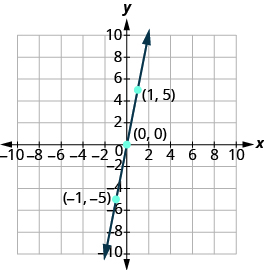
try it
[ohm_question]147001[/ohm_question]Choosing the Most Convenient Way to Graph a Line Given an Equation
While we could graph any linear equation by plotting points, it may not always be the most convenient method. This table shows six of equations we’ve graphed in this chapter, and the methods we used to graph them.| Equation | Method | |
|---|---|---|
| #1 | [latex]y=2x+1[/latex] | Plotting points |
| #2 | [latex]y=\Large\frac{1}{2}\normalsize x+3[/latex] | Plotting points |
| #3 | [latex]x=-7[/latex] | Vertical line |
| #4 | [latex]y=4[/latex] | Horizontal line |
| #5 | [latex]2x+y=6[/latex] | Intercepts |
| #6 | [latex]4x - 3y=12[/latex] | Intercepts |
Choose the most convenient method to graph a line
- If the equation has only one variable. It is a vertical or horizontal line.
- [latex]x=a[/latex] is a vertical line passing through the [latex]x\text{-axis}[/latex] at [latex]a[/latex]
- [latex]y=b[/latex] is a horizontal line passing through the [latex]y\text{-axis}[/latex] at [latex]b[/latex].
- If [latex]y[/latex] is isolated on one side of the equation. Graph by plotting points.
- Choose any three values for [latex]x[/latex] and then solve for the corresponding [latex]y\text{-}[/latex] values.
- If the equation is of the form [latex]Ax+By=C[/latex], find the intercepts.
- Find the [latex]x\text{-}[/latex] and [latex]y\text{-}[/latex] intercepts and then a third point.
example
Identify the most convenient method to graph each line: 1. [latex]y=-3[/latex] 2. [latex]4x - 6y=12[/latex] 3. [latex]x=2[/latex] 4. [latex]y=\frac{2}{5}x - 1[/latex] Solution 1. [latex]y=-3[/latex] This equation has only one variable, [latex]y[/latex]. Its graph is a horizontal line crossing the [latex]y\text{-axis}[/latex] at [latex]-3[/latex]. 2. [latex]4x - 6y=12[/latex] This equation is of the form [latex]Ax+By=C[/latex]. Find the intercepts and one more point. 3. [latex]x=2[/latex] There is only one variable, [latex]x[/latex]. The graph is a vertical line crossing the [latex]x\text{-axis}[/latex] at [latex]2[/latex]. 4. [latex]y=\Large\frac{2}{5}\normalsize x - 1[/latex] Since [latex]y[/latex] is isolated on the left side of the equation, it will be easiest to graph this line by plotting three points.try it
[ohm_question]147002[/ohm_question]Contribute!
Licenses & Attributions
CC licensed content, Original
- Question ID 147001, 146998, 146999, 147002. Authored by: Lumen Learning. License: CC BY: Attribution.
CC licensed content, Specific attribution
- Prealgebra. Provided by: OpenStax License: CC BY: Attribution. License terms: Download for free at http://cnx.org/contents/[email protected].
